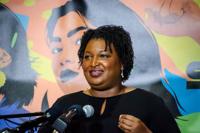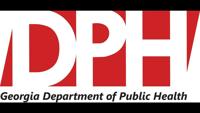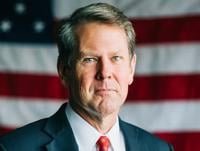The Georgia Recorder
The headlines blared and the news was treated as a thunderbolt, something cataclysmic.
A ruling from the U.S. Supreme Court backed a Washington state high school football coach who had been fired for participating in a prayer with his team on the field at a public school. The Supreme Court’s conservative majority ruled the coach was simply exercising his First Amendment rights to free speech.
Coaches, especially in the South, wondered what the furor was all about. They have been leading their teams in prayer, or participating in player-led prayer, “for centuries” said one coach, and the ruling had little impact.
“It legitimizes a practice that has been going on for years,” said Mike Duffie, the basketball coach at Pickens County High School. “A prayer before a game is a community standard. The group in Wisconsin (Freedom from Religion Foundation) would get an injunction against a coach, but by and large it didn’t affect anything.”
Allen Fort, the superintendent of Taliaferro County schools and a long-time teacher, coach and administrator, said, “When you go back to the first football game ever played in high school in Georgia, and just because of the society that we were in, most coaches wanted to lead and offer strength, and offered a prayer of safety.”
“It became a rite of passage for that coach to say ‘Lord protect our players’. It was a custom, not a religious exercise so to speak. It was done on the sideline or the huddle. Heck, I did it when I coached. You just said to the boys ‘Let’s gather in’. You didn’t say ‘get your butt in this huddle and bow your head’.”
But are these prayers so innocent and harmless? To many, the high court’s ruling was indeed a thunderbolt and the banner headlines justified, in a different way.
“I’ll give it to some people that they may feel their intentions are innocent, but they don’t get to define what the impact is for those of us who aren’t Christian,” said Joshua Lesser, the Rabbi Emeritus of Congregation Bet Haverim of Atlanta, a Jewish house of worship. “And the fact that they’re not sensitive, or willing to listen to what that impact is means that they actually are turning away from hearing the fullness of their students.
“It’s like a pedophile saying, ‘oh, this was meant to be a good touch.’ I think it’s as corrupt as that at times. The perpetrator doesn’t get to define what the experience is like for those on the other side.”
And what of future coaches among the gatherings of these athletes in Christian prayer?
“These kids are learning from their coaches,” Lesser said. “These kids may go on to a different atmosphere and think that it’s OK (to offer only Christian prayer) because their coaches never once brought up the idea of diversity.”
Lesser still remembers as a young public school teacher not bowing his head in a prayer to “Jesus Christ Our Savior” before a morning function at the school. He was circled by some teachers afterwards and castigated.
In 2017, John Small, the football coach at East Coweta High School, was supposedly ordered by Coweta County school officials to stop joining in with a player-led prayer after games. The Freedom from Religion Foundation wrote a letter to Coweta County reminding them that Small’s conduct was unconstitutional because he was endorsing and promoting his religion when acting in his official capacity as a school district employee.
Last week, days after the Supreme Court issued the ruling, Small said he never had a problem with local school officials over joining his players in prayer.
“It was business as usual,” Small said. “The school board here was unbelievable supporting us. They had our back from day one. I think there was a misconception at the beginning that there wasn’t that support, but our leadership in this county was behind us 100%.”
How did it change what Small did?
“It didn’t,” the coach said.
So, did Small not stop joining players in prayer?
“No,” he said. “We were not worried about it because we’re trying to do the right thing.”
Small, of course, was delighted in the ruling for the Washington state coach.
“There’s so many things going on the world today that are crazy, but there’s one consistent and that’s Jesus Christ,” Small said. “And to be able to see that the Supreme Court recognize that gives us our freedom to do that. What an awesome day.”
Joseph Kennedy, the coach in Washington state’s Bremerton School District, did not just participate in the prayers on the field after games, he seemed to lead a religious revival at a public school.
U.S. Supreme Court Justice Neil Gorsuch said the coach conducted his prayers “quietly,” as if in a private moment. There are pictures of Kennedy surrounded by players on both teams.
And that is what is worrying to people who do not want the Christian religion promoted on school grounds. It is the establishment of one religion over others.
Fort said there still needs to be some boundaries.
“If you’re smart, you need to jump on it right then and there,” Fort said. “Tell them ‘We’re going to do a moment of silence and within that moment of silence you can say a prayer.’”
Fort has some unease about what comes next with the SCOTUS ruling. “The Supreme Court threw down a decision and expects everybody to deal with it,” he said.
“What you want as a principal is a relationship with the coach where if this comes up you can say to the coach ‘I don’t mind you praying for the boys’ safety because I believe in you, but let’s not make it a religious experience.’ They are children and you want them inspired, but not intimidated.”
But Rabbi Lesser feels it’s too late for Fort and other administrators to hold back what’s coming. The ruling was a thunderbolt, to be sure.
“The match has been lit,” Lesser said. “And it’s only a matter of time for the fuse to catch fire. I’ve always felt that this is a Christian country and where you are in this country depends on the kinds of tolerance or acceptance, or even potentially welcoming, of people of other faiths.
“This court decision has emboldened the folks who really want to see this definitively as a Christian nation. The only good news for me is that what has been hidden is now revealed.”
Small and Duffie said coaches typically do not try to turn the pre-game or post-game huddle into a religious experience. Both coaches insist they have never witnessed coercion by a coach over an athlete regarding their faith.
“I have left the prayer up to my players,” Duffie said. “Generally, most of my teams have said The Lord’s Prayer before games. Sometimes I am with them in the dressing room, sometimes I’m not. It’s not a religious service.”
“Our prayers are player-led by the team and the players and I think it needs to be that way,” Small said. “We’re never going to force our beliefs and views on anybody, but we’re just going to try to live a life that’s an example for others, and then they get to make a choice.”
Coaches in the South look out over their teams and may think they see faces of Christian boys and they are preaching to their choir. But how well do they really know the choir?
“I imagine even in that group of 40 players around the coach, as homogenous as they may seem, not everyone might be religious,” Lesser said. “And no doubt because religion has been harmful, I imagine that some of those boys have been harmed by religion, in one way or another. You’re not creating an atmosphere, where people can truly speak their minds and there are fears of repercussions, like when they will be in the starting lineup.”











(0) comments
Welcome to the discussion.
Log In
Keep it Clean. Please avoid obscene, vulgar, lewd, racist or sexually-oriented language.
PLEASE TURN OFF YOUR CAPS LOCK.
Don't Threaten. Threats of harming another person will not be tolerated.
Be Truthful. Don't knowingly lie about anyone or anything.
Be Nice. No racism, sexism or any sort of -ism that is degrading to another person.
Be Proactive. Use the 'Report' link on each comment to let us know of abusive posts.
Share with Us. We'd love to hear eyewitness accounts, the history behind an article.